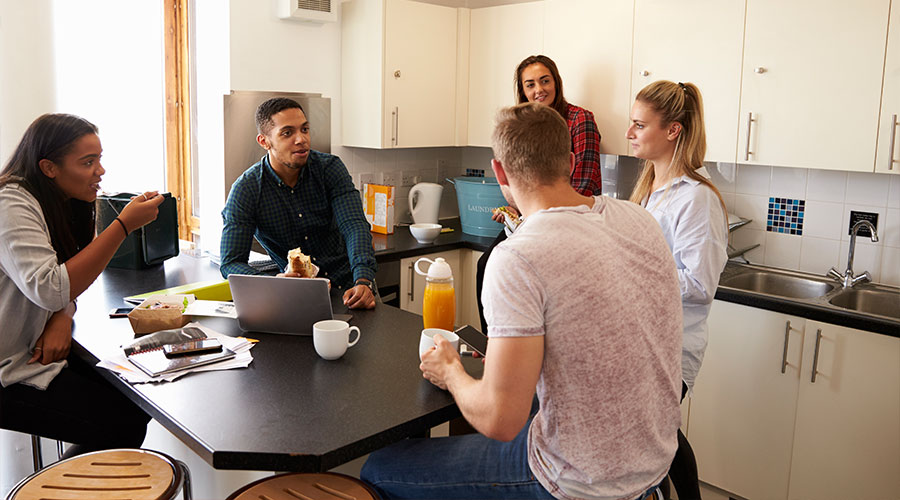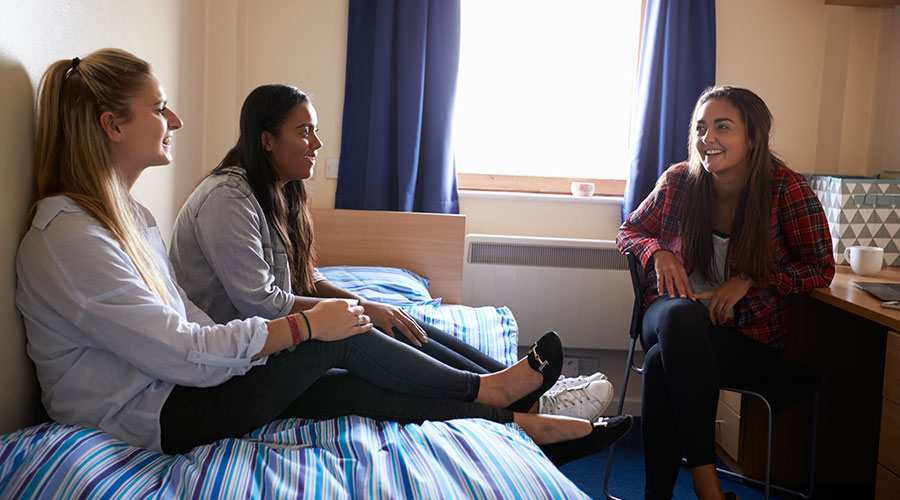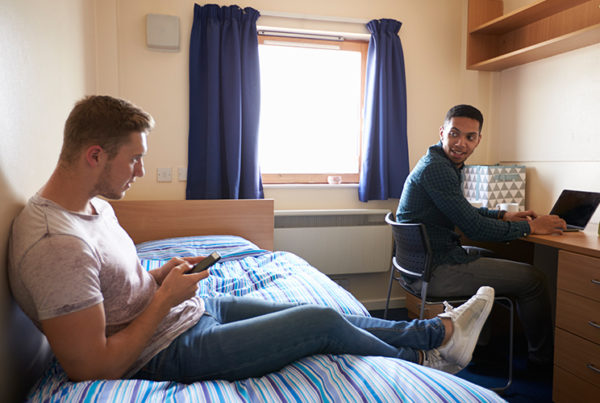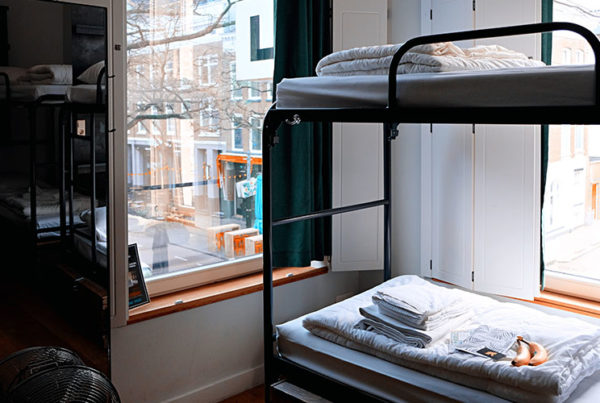Finding the ideal student accommodation in Cape Town can be a massive challenge. There are so many different factors to consider when choosing from the different student accommodation options available. When looking at the pros and cons of different types of on-campus and off-campus accommodation you have to think about the lifestyle fit, proximity to your campus and transport routes, and much much more.
Take the stress out of making your decision by finding out the difference between residence, student digs, and private student accommodation in Cape Town.
Student digs
The “Shared” living environment
Living in a digs means that you rent a room in a house occupied by students and young professionals. You’re likely to live co-ed with another 3-5 students (although house sizes vary) and have your own room, but share common spaces like the kitchen, lounge, and bathroom.
A student digs setup is a lot of fun. It’s less crowded than a traditional residence building which has dozens of rooms – but you still live alongside students of similar age, enrolled at universities in Cape Town. As a bonus, some days you might be able to split the bill for meals, cleaning services or other household expenses.

Advantages
A student digs is different from residence accommodation. It provides more independence as you may have less rules, potential curfews and policies to be wary of.
You’ll also pick up helpful information about Cape Town, hacks for student living and enjoy socialising as there’s always something going on in a digs.
Some household tasks will be off your plate as most student digs have an existing housekeeper and additional chores typically form part of a schedule for each resident – which can make “adulting” a whole lot easier.
The suburbs surrounding university locations in Cape Town are full of student digs meaning you will have a choice of suburbs each with their own character and local attractions. You can live near the city centre for a host of entertainment and other activities or close to the mountain if nature is more your thing.
Disadvantages
You won’t have access to after hours programmes offered by university residences like on-site tutoring, counsellors or mentors.
You are unlikely to have a management team to settle any issues with your living space such as a broken lock or plumbing maintenance. This means you may have to organise service providers or at the very least make yourself available when they come to fix things.
You also have to make sure you are able to get to class on time. If you plan to get to UCT for example, living near a Jammie Shuttle stop your best bet for free transport. Otherwise, for universities requiring you to travel a bit further, such as UWC in Bellville, you’d want to insure a train stations is located near your digs.
Residence Living
The “on-campus” lifestyle.
Residence is on-campus accommodation for university students. You’ll need to apply with high enough marks high to be considered and getting into residence can be a challenge. Once you have been accepted, you are assigned a room, usually shared with a flatmate in a section of the residence. You share a small common area as well as bathrooms with your section and a dining hall and larger common areas with the entire residence. Residences can be co-ed or single sex depending on the residence.
The lifestyle “res” provides is ideal for students looking to be immersed in the university experience, as you’re on-campus surrounded by other students sharing rooms and common spaces.

Advantages
You’re always a part of the university vibe, so get stuck in! You’ll be able to join societies and take on leadership roles that look great on your C.V.
A welcome week is standard for first year students starting their university journey which often involves engaging events, socialising with peers and making new friends.
There are lots of facilities and support available to you. In welcome week you’ll
find out where laundry rooms, common areas for chatting and watching TV, as well as dining halls, computer centres and sports fields are located. You will also have access to counsellors, mentors, and fellow res members to help you with getting accustomed to the on-campus lifestyle – whether that’s finding the right building for a class or if you’re in need of any information, and advice
Living on your university’s grounds is quite safe as they’re monitored by security guards, cameras and certain areas are only accessible by using your student card. Some larger blocks may have a small reception area too.
Breaking the ice and creating potentially lifelong friendships is made easier by knowing that your first year peers are in the same boat and are getting used to living on-campus just like you.
Disadvantages
Residences will offer meal plan packages in addition to your accommodation fees, so you don’t shop for groceries and cook, but you can’t afford to be picky either. Mealtimes will take place in a dining hall so you’ll need to get across university grounds in all weather conditions (even in the wicked Cape Town winter). Teas, coffees and snacks for the rest of the day are your responsibility.
Personal space and privacy is a bit limited when you’re living amongst hundreds of other students, but it can help to know a peer or friend is just around the corner if you’re feeling like a chat.
Private Accommodation
Living a private life..
Private accommodation covers a range of off-campus student accommodation. There are options ranging from garden cottages, shareable with a flatmate or friend, to single bedroom flats for living alone, however, private residences are the most popular.
Many students choose private residences as they have many of the lifestyle benefits of on-campus residences combined with the privacy and freedom of a student digs. Private residences are exclusively for students, however they are not university specific. They are modern and designed with the student lifestyle in mind and often give you the choice of your own room, are co-ed and have a lot less rules than on-campus residences. Nest, is a great example of one of these dynamic havens for students of several universities across Cape Town.

Advantages
Private accommodation is a great option for students to enjoy more independence and freedom than they would living in residence, as there are less rules to adhere to – usually just your lease conditions or your private residence rules.
The level of security in modern blocks of flats and private residences is usually high, as often blocks are equipped with fingerprint access, 24 hour CCTV and a savvy building (security) staff.
Private accommodation also gives you more choice in terms of location than residence, so you can still be central to shops, restaurants, and transport options.
In private residences, and specific apartment blocks, extra perks may be included. Having your monthly water bill covered and access to high speed WiFi and a gym helps your budget last long. At Nest, a modern private residence in Cape Town, these benefits are included within your rental.
If you choose a private residence, rooms are rented by a diverse range of students, local and international, so you’re sure to find interesting new friends really quickly.
Private accommodation usually allows you to keep your room during the holidays, as long as you’re extending your lease into your next year of studies. Whereas, on-campus residences can close or have you move your belongings to another block which can cause added stress.
So, you can spend your December vacation with new friends exploring Cape Town and all it has to offer.
Disadvantages
Living alone in a private flat can get lonely if you are a person who likes to be around people. Choosing a private residence gives you space for privacy and room for socialising in your spare time.
Living in a flat, you’ll need to think about costs for water, WiFi and electricity as these are not always included in the rent. While maintenance is usually the landlord’s responsibility you may have to put up the money for urgent repairs if needed.
You also won’t experience as much of the student lifestyle atmosphere as you would living on campus or in student accommodation. Transport to campus is also a necessary consideration, so make sure your apartment or private accommodation is location near public transport.
Try to predict what a “day in your life” might look like and require while studying at your choice of university. Use this outlook to help you choose which type of student accommodation will best suit you, and your desired lifestyle.
Looking for the best of both worlds?
Nest offers facilities that mesh the atmosphere of student life, with the independence of private living. You’re around dynamic learners studying courses at universities across Cape Town with access to amenities such as great security, a rooftop gym and lounge areas kicking back and relaxing in your free time.

You’ll have access to plenty of personal space, as well as the ability to socialise in our lovely lounge and common areas. You’re also really close to nearby restaurants, malls, hospitals, transport routes and within a decent proximity to the Old Biscuit Mill and Riverclub Golf Course.
If you need any ideas for what to include on your shopping list for living on your own or with friends before you start studying, why not check out our comprehensive shopping list for some ideas?
So, join us in Durban Road in Mowbray by booking a viewing for our spacious, modern apartments and the spectacular sight of Table Mountain!





